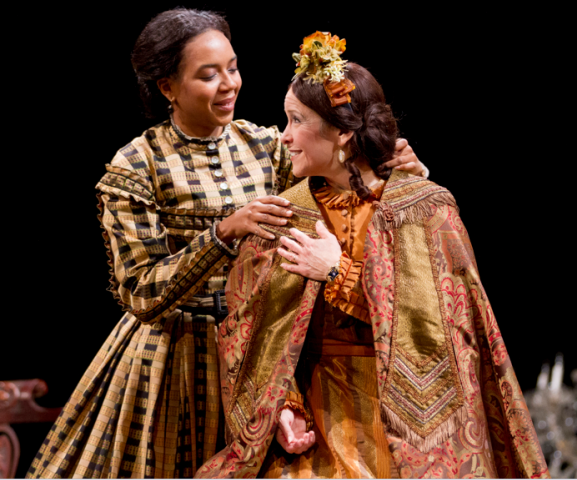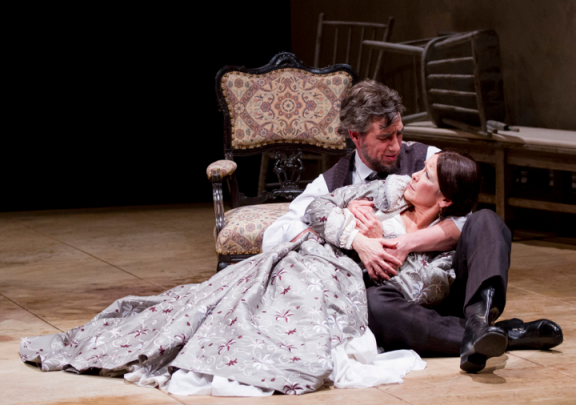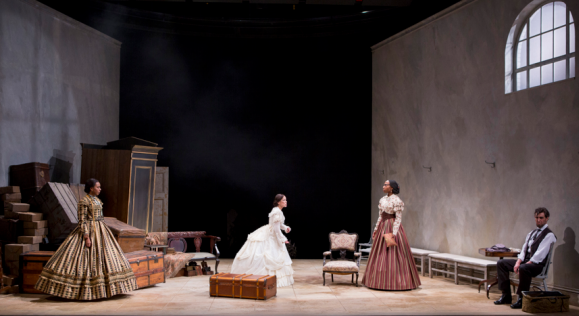Jordan Wright
March 31, 2013
Special to The Alexandria Times

(L-R) Sameerah Luqmaan-Harris as Elizabeth Keckly and Naomi Jacobson as Mary Todd Lincoln – Photo by Scott Suchman.
Four indisputably exceptional actors command the stage at Arena Stage’s world premiere of Mary T. and Lizzy K. Of that there should be no argument. They are a master class in acting – – powerful and fierce in their portrayals of their roles. But what’s troubling here is not the fine acting by Naomi Jacobson as Mary Todd Lincoln, Sameerah Luqmaan-Harris as Mary’s dressmaker, Elizabeth Keckly, Thomas Adrian Simpson as Abraham Lincoln, and Joy Jones as Lizzy’s assistant, Ivy, it is the disjointed script and tedious dialogue by Tazewell Thompson, who also serves as the play’s director. Adapted from the book Mrs. Lincoln and Mrs. Keckly by Jennifer Fleischner, Thompson’s attempt to portray the women as friends is a flimsy frame on which to hang the plot.
Tazewell’s own notes describe the two women’s relationship as a “partnership and sisterhood…a formidable alliance”. But is it really? Mary holds Lizzy in her thrall by not paying her for the last twenty-seven ensembles. A condition that would be more aptly referenced as indentured servitude. The play slogs on as Mary degrades and belittles Lizzy, begging then ordering her to make another frock to wear to her countless parties, to which Lizzy capitulates, “Tell me who I am and what I must do for you.” Though Lizzy has already bought her freedom, Mary clearly has taken ownership of Lizzy’s life. Far from an equal relationship, it seems more akin to the Stockholm syndrome.

Naomi Jacobson as Mary Todd Lincoln and Thomas Adrian Simpson as Abraham Lincoln – Photo by Scott Suchman.
Mary’s lavish spending and melancholia have been well documented in many historical writings, yet Tazewell’s interpretation puts the focus exclusively on these two points. These are Mary’s opening lines, “An Indian spirit is removing the bones from my cheeks. I am inundated by strangers that invade my thoughts.” Is this a woman who might be considered a reliable friend? The director defines their “friendship”, as “marked by its warmth, trust, intimacy and loyalty.” You may recall that slave owners also referred to their house servants as loyal and trustworthy.
Thompson imagines Mary as bipolar – by turns ferociously jealous, vengeful, bullying and delusional, then flipping like a light switch into girlish charm and political shrewdness. She would give Martha from Who’s Afraid of Virginia Woolf a run for her money. Certainly there were moments I thought I had stepped into the wrong theatre.
Tazewell’s odd device to hold this disjointed piece together is Mary’s preoccupation with her clothes. Mind numbing nattering about the fashions of the day fill the script and stunt the play’s momentum.
Mary spends a great deal of time center stage on a trunk, while Lizzy and her indentured assistant Ivy, conduct fittings. Mary carps about the perils of her unwieldy dresses – – bones and stays, crinolines and hoops, and a device worn under the dress called a “pagoda” that she loathes yet cannot do without – – and yet she wants more clothes, more shoes, more hats and more shopping sprees. See what comes of being a clotheshorse, the play seems to say.

(L-R) Sameerah Luqmaan-Harris as Elizabeth Keckly, Naomi Jacobson as Mary Todd Lincoln, Joy Jones as Ivy and Thomas Adrian Simpson as Abraham Lincoln – Photo by Scott Suchman.
As for the costumes by designer Merrily Murray-Walsh, they accurately reflect the popular 19th C fashions of the day from Godey’s Lady’s Book, but designer Donald Eastman’s set, described in the playbill as “a room”, is little more than a smattering of piled up trunks, an unhung chandelier and an armoire, looking more like the contents of an attic than a proper Victorian parlor.
Through April 28th at Arena Stage, 1101 Sixth St., SW, Washington, DC 20024. For tickets and information call 202 484-0247 or visit www.ArenaStage.org.
Leave a Reply